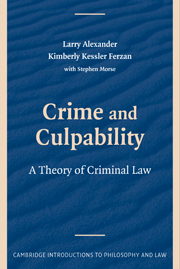2 - The Essence of Culpability
Acts Manifesting Insufficient Concern for the Legally Protected Interests of Others
Published online by Cambridge University Press: 05 June 2012
Summary
The Model Penal Code revolutionized mens rea by reducing mental-state terminology to four concepts: purpose, knowledge, recklessness, and negligence. As defined by the Model Penal Code, purpose requires that the forbidden result be one's conscious object or that one is aware – or hopes or believes – that a forbidden circumstance (e.g., that the property one is receiving is stolen) exists. Knowledge with respect to results (e.g., death, injury, destruction) requires that one be practically certain that one's conduct will bring about such results. Knowledge with respect to circumstances requires that one be aware that such circumstances exist. Recklessness entails the conscious disregard of a substantial and unjustifiable risk that a forbidden result may occur or that relevant circumstances exist. Negligence requires that one is unreasonably unaware of a substantial and unjustifiable risk that the forbidden result may occur or that the relevant circumstances exist. This hierarchy presupposes that purpose is more culpable than knowledge, knowledge is more culpable than recklessness, and recklessness is more culpable than negligence.
Although we believe that the Model Penal Code brought much greater clarity than the myriad concepts employed by the common law, we still believe that more progress can be made. In this chapter, we reconceptualize culpability. We begin with an analysis of recklessness and argue that the substantiality prong is not independent of the justifiability prong. We also argue that recklessness must be understood subjectively, not objectively.
- Type
- Chapter
- Information
- Crime and CulpabilityA Theory of Criminal Law, pp. 23 - 68Publisher: Cambridge University PressPrint publication year: 2009
- 1
- Cited by



